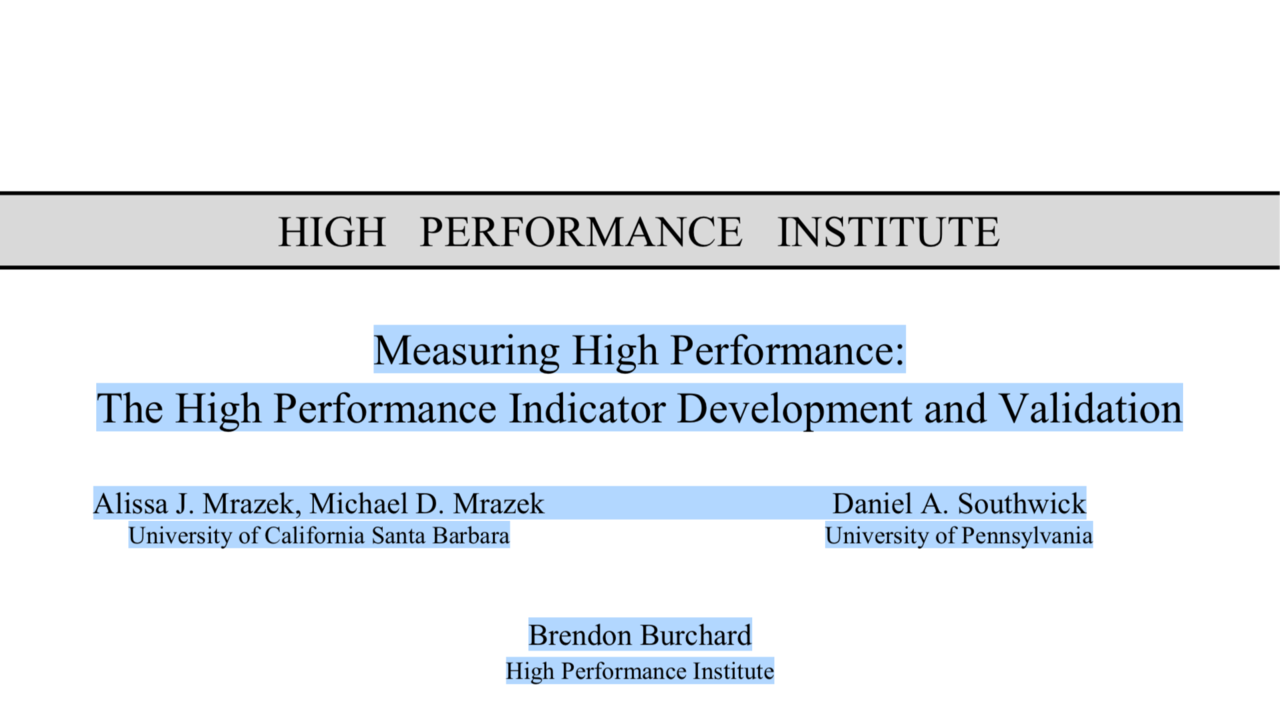Measuring High Performance: The High Performance Indicator Development and Validation
May 23, 2019
HPI is delighted to publish its research and findings on our ongoing efforts to academically measure and validate high performance.
The abstract is below, and you can view the entire report here.
Measuring High Performance: The High Performance Indicator Development and Validation.
By Alissa J. Mrazek, Michael D. Mrazek, University of California Santa Barbara; Daniel A. Southwick, University of Pennsylvania; Brendon Burchard High Performance Institute
Abstract:
The desire to maximize potential and performance is one of the greatest motivators of the human spirit. Philosophers, scientists, and personal development leaders have long sought to understand the attitudes, behaviors, and traits that enable people to excel, succeed over the long term, and make the most of their lives. However, despite their mutual interest in the topic, little has been done to synthesize efforts across fields. Under the direction of Brendon Burchard, scientists and high performance coaches at High Performance Institute collaborated to create an assessment that measures the habits that lead to long-term success across domains. The assessment, called the High Performance Indicator (HPI), is comprised of six subscales that separately measure clarity, energy, necessity, productivity, influence, and courage. Two studies with a total of 174,054 participants, showed that the HPI was predictive of several important life outcomes. In Study 1, the HPI was predictive of happiness (r = .58), confidence (r = .67), education level (rs = .137), perceived excellence, (r = .50) and perceived success in comparison to peers to over the long term (r = .67, p < .001). However, the internal consistency and dimensionality of HPI subscales in Study 1 could be improved due to some unclear questions and overlapping items. In Study 2, modified HPI items showed a high-level of internal consistency for each subscale (Cronbach’s α’s from .74 to .87), and a latent dimensionality that reflected six unique constructs. Similar to Study 1, HPI scores in Study 2 were predictive of important life outcomes, such as life satisfaction (r = .62), quality of interpersonal relationships (r = .22), work quality (r = .60), career impact (r = .58), and income (rs = .23). Subsequent analysis of of n = 109 attendees of High Performance Academy provided evidence that these habits could be substantially enhanced through high performance training (d = 1.04).
Read the full report here.
For inquiries, write support@hpxlife.com.
Lorem ipsum dolor sit amet, consectetur adipiscing elit. Cras sed sapien quam. Sed dapibus est id enim facilisis, at posuere turpis adipiscing. Quisque sit amet dui dui.
Stay connected with news and updates!
Join our mailing list to receive the latest news and updates from our team.
Don't worry, your information will not be shared.
We hate SPAM. We will never sell your information, for any reason.

